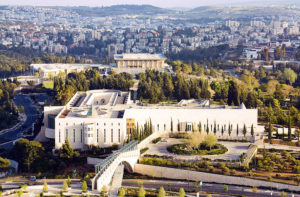September 5, 2017
Avner Cohen, Brandon Mok
The James Martin Center for Nonproliferation Studies (CNS) has published a comparative study, “Nuclear Legislation and Governance in Four Nuclear Weapons Democracies,” researched and written by CNS/Davis United World College Fellow Brandon Mok, under the direction of Dr. Avner Cohen, a professor of nonproliferation studies at the Middlebury Institute of International Studies at Monterey and a CNS senior fellow.

Israel Supreme Court (Src: Wikimedia Commons)
The report presents a set of comparative raw data on the question of how four Western democratic nuclear-weapon states— the United States, the United Kingdom, France, and Israel—handle the essential tension between nuclear weapons (which require secrecy) and liberal democracy. The initial intent of this work was to assist Dr. Cohen in his preparations for an unprecedented hearing at the Israeli High Court of Justice in September 2017, whereby the Court would hear a petition, signed by over 100 Israeli citizens, calling for regulation and oversight of the Israeli Atomic Energy Commission. The petitioners cited the legal lacuna under which Israel’s nuclear activities operate, devoid of oversight and beyond the realm of law, in violation of fundamental democratic principles.
In particular, the study assesses the comprehensiveness—the breadth and depth—of the legislative, regulatory, scientific, and policy mechanisms that each of these four democratic states have created to govern its nuclear affairs in the following categories or parameters: legislation, organizations (directly responsible for either civilian and military applications of nuclear materials or both), regulation, oversight, secrecy, and policy making.
Such material has never before been publicly available in a condensed form in one location, making this study of use to anyone interested in the problem of governing the atom. It will be updated as structures and policy change.
The Jerusalem Post ran an exclusive story on the report, ahead of the High Court hearing.
